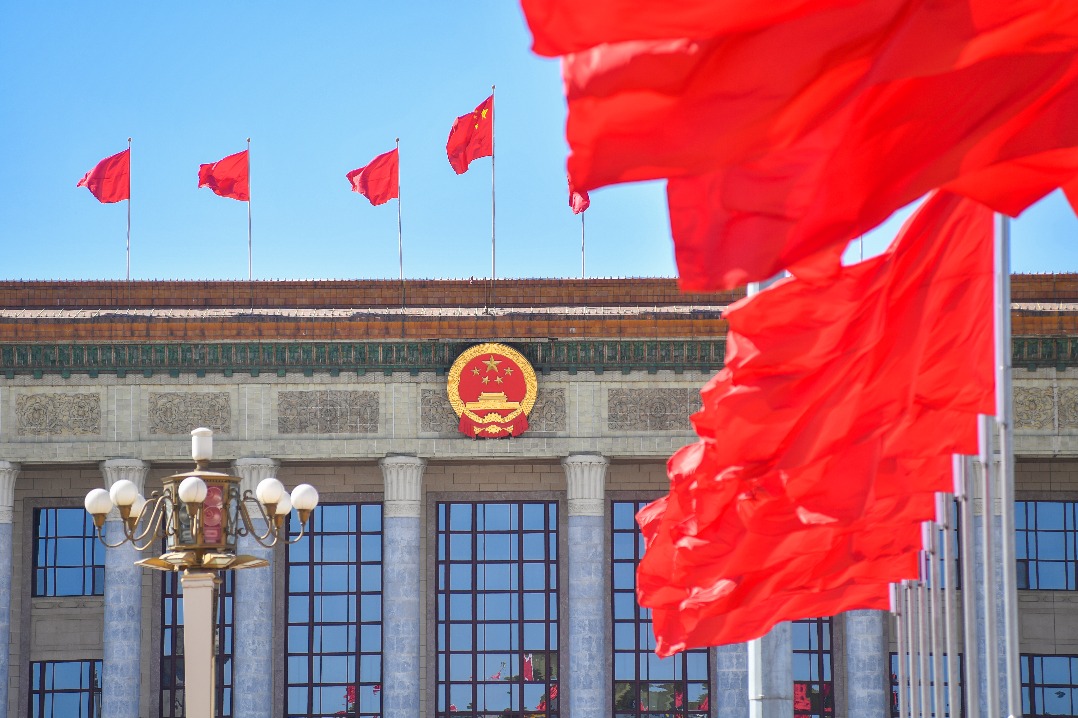Customs ensures HK supplies






24/7 services and simplified clearance keep medical goods and food flowing
Customs departments at major exit and entry ports in Guangdong province have opened 24-hour services to ensure all-day customs clearance for food and goods sent to Hong Kong to help the city fight its COVID-19 outbreak.
Chen Chao, a senior officer from Shenzhen Bay customs, said an average of 1,000 trucks carrying face masks, testing kits and related anti-COVID-19 and livelihood materials, are leaving Shenzhen Bay Port for Hong Kong every day.
"Customs officers have been arranged to be on duty 24 hours and special green channels have been opened to ensure all the materials can be inspected and quarantined upon arrival," Chen said.
At Huanggang port, Shenzhen customs has also opened special counters to guide customs declarations and handle related business to guarantee 24-hour clearance.
Customs departments in the province have simplified procedures and shortened the clearance time to ensure "zero-delay" of goods and related materials to Hong Kong, customs authorities said.
In Foshan, a batch of more than 1.5 million medical face masks in four standard containers and 250,000 antigen detection reagents was sent to Hong Kong on ships that were loaded at the city's Beijiao and Rongqi ports.
"With the support and guidance of customs departments, it took only half a day for the shipment of these masks from the factory to the port, which allows us to arrange the shipment more flexibly," said Deng Weiqi, chairman of Foshan Nanhai Plus Medical.
The Guangdong Provincial Department of Commerce said on Wednesday the province has opened six special water routes to Hong Kong.
Meanwhile, Guangdong, the major supplier of meat, vegetables and related agricultural products in Hong Kong, has opened multiple channels to ensure smooth transportation and guarantee adequate supplies of other daily necessities and medical materials.
In addition to the traditional land passages, in which a large number of trucks operate between Shenzhen and Hong Kong, a special freight train carrying 18 containers departed Shenzhen for Hong Kong on Wednesday to help stabilize the supply of goods from the mainland to Hong Kong, China Railway Guangzhou Group said on Wednesday.
Traveling a 20-kilometer route from the Pinghu South National Logistics Hub in Shenzhen to the MTR Lo Wu marshaling yard in Hong Kong, the Shenzhen-Hong Kong freight train carried nearly 1.11 million rapid antigen test kits, 20,000 protective suits and other medical supplies. The journey took about 35 minutes.
Shenzhen's Yantian port now has ships heading to Hong Kong every day, playing a role in supporting the city's fight against COVID-19, said Dong Yanze, an official with Shenzhen's transportation bureau.
"Water transportation, which has the advantages of safety, environmental protection and strong transportation capacity, is an important supplement to land transportation and will become a main force of cross-border transportation, playing a big part in supplying anti-COVID-19 and livelihood materials to Hong Kong," Dong said.
The General Administration of Customs said the Chinese mainland supplied more than 2,561 metric tons of vegetables, 675 tons of fruit, 466 tons of chilled and frozen meat, 199 tons of aquatic products, 263 tons of eggs and 180 tons of dairy products to Hong Kong on Tuesday.
In another move to boost food supplies, 38 butchers from the mainland arrived in Hong Kong on Wednesday to supplement the COVID-19-infected workforce at the city's temporarily shuttered Sheung Shui slaughterhouse for two months, in an effort to resume a stable supply of fresh meat to the city.
The city's two slaughterhouses, at Sheung Shui and Tsuen Wan, were closed on Saturday after butchers there tested positive for COVID-19.
The Sheung Shui slaughterhouse-the largest slaughterhouse and major supplier of fresh meat in the city-is still closed, while the Tsuen Wan abattoir partially reopened on Sunday.
China Resources Ng Fung, the operator of the Sheung Shui abattoir, said the 38 backup butchers will help the business resume operations, and that it will not be long before the facility resumes full production.
- Haikou intl airport launches new 24-hour direct transit policy
- China-Laos international passenger line launched
- Beijing receives climate award at COP30 Local Leaders Forum
- Natl fire safety month promotes public safety awareness, risk prevention
- China reforms research review to boost young university staff
- Chinese researchers find freshwater snail species missing for nearly a century
































